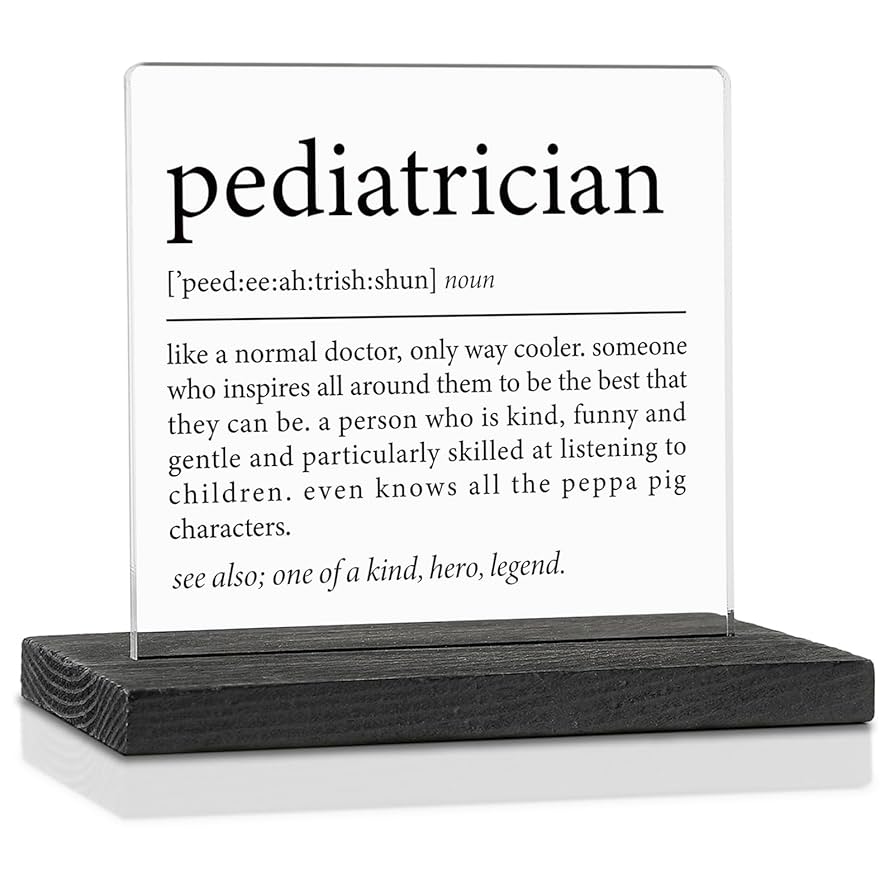Why parents rely on hummingbird pediatrics for growth monitoring
Wiki Article
Checking Out Typical Therapy Choices Provided by Your Regional Pediatrician for Growing Children
Regional doctors play an important function in the health and growth of children. They supply a variety of therapy choices, from routine inoculations to address preventable diseases, to developing screenings that can recognize very early hold-ups. Nutritional suggestions is also supplied to ensure kids preserve balanced diet regimens. There are various other crucial aspects of pediatric care that parents need to consider. Understanding these can considerably affect a youngster's general wellness.The Importance of Normal Check-Ups
While many moms and dads might view exams as a plain routine, they play a critical function in a child's total health and advancement. Regular check-ups give pediatricians with the possibility to monitor growth landmarks, analyze developing progress, and determine any kind of potential health and wellness problems beforehand. These sees permit doctor to carry out physical examinations, track essential indicators, and examine dietary needs.
Inoculation Timetables and Immunizations
Vaccination schedules are critical for guaranteeing that infants obtain important injections promptly, safeguarding them from numerous avoidable illness. As youngsters grow, school-age booster shot needs become progressively vital to keep public health and wellness criteria. Recognizing these vaccination guidelines is necessary for moms and dads to ensure their youngsters are adequately secured.Crucial Vaccines for Babies
Assuring that infants obtain necessary vaccinations is vital for their health and wellness and the well-being of the area. Pediatricians advise a series of booster shots beginning at birth, including vaccines for liver disease B, diphtheria, tetanus, pertussis (DTaP), Haemophilus influenzae type b (Hib), pneumococcal conjugate (PCV13), and inactivated poliovirus (IPV) These vaccines safeguard babies from significant diseases that can cause issues or fatality. The immunization schedule commonly complies with certain timelines, with doses offered at 2, 4, and 6 months of age. Additionally, the measles, mumps, and rubella (MMR) injection is presented around 12 months. Abiding by these inoculation routines guarantees that infants construct resistance while adding to herd immunity, protecting the area versus outbreaks.School-Age Immunization Needs
What booster shots are necessary as kids move right into school-age child? As children shift to institution, details inoculations are crucial to shield their health and wellness and the wellness of their peers. The Centers for Condition Control and Prevention (CDC) recommends that kids get the DTaP (pertussis, tetanus, and diphtheria), IPV (suspended poliovirus), MMR (measles, mumps, and rubella), and varicella (chickenpox) vaccinations. In addition, the yearly influenza injection is encouraged. These booster shots are generally carried out between ages four to 6, though some may be given earlier based on private wellness requirements and local laws. Doctors play a vital role in guaranteeing that vaccination timetables are adhered to, offering advice and sources to parents concerning the value of keeping youngsters immunized.Developing Testings and Assessments
Early recognition of developmental hold-ups is vital for efficient treatment, many moms and dads may not be mindful of the importance of routine testings and evaluations. Doctors utilize developmental screenings to review a youngster's development in various domains, consisting of physical, cognitive, social, and emotional abilities. These analyses normally take place during regular check-ups and are made to recognize any potential worries early.Standard devices and sets of questions help pediatricians gather information about a kid's advancement, enabling prompt recommendations to specialists if required. Analyses can also provide insights right into a youngster's strengths and areas that might require additional support.
Moms and dads are encouraged to participate in these screenings proactively, as they play a vital function in their kid's wellness. By getting involved in developmental assessments, parents can guarantee that their youngster obtains the proper sources and interventions, cultivating a foundation for lifelong understanding and development. Regular screenings add greatly to a youngster's general well-being.
Nourishment and Dietary Support
Nutritional health plays a significant role in a kid's general advancement and wellness, enhancing the understandings obtained from developmental screenings. Doctors concentrate on giving tailored nourishment and dietary assistance to satisfy the specific demands of growing youngsters. This consists of enlightening parents about balanced diet plans, emphasizing the importance of fruits, veggies, entire grains, and lean proteins.Doctors frequently analyze a youngster's development patterns and dietary practices to determine any type of nutritional deficiencies or excesses. They may advise age-appropriate section sizes and healthy and balanced snacks to motivate far better eating habits. Furthermore, doctors address typical issues such as food allergies and intolerances, leading family members on just how to handle these difficulties within a healthy and balanced diet plan.
Behavioral and Mental Wellness Assistance
read this post here Understanding that behavior and emotional wellness is essential for a child's general advancement, doctors are significantly concentrating on offering comprehensive assistance in these areas. They recognize that mental wellness issues can materialize early in life and affect a kid's capacity to learn, interact socially, and grow. Doctors frequently carry out screenings for anxiousness, clinical depression, and behavioral conditions during routine brows through to identify potential problems.Furthermore, they might use therapy or refer family members to mental health experts when needed. Pediatricians additionally give resources to assist moms and dads manage behavioral obstacles in your home, such as carrying out favorable reinforcement strategies and developing regular routines. By fostering open interaction, they motivate families to talk about emotional issues and advertise a supportive setting. This way, doctors play a substantial duty in assisting youngsters and their families in the direction of healthy emotional and behavior advancement, making certain that youngsters obtain the all-inclusive treatment they need to prosper.
Management of Acute and Persistent Conditions
Reliable monitoring of both intense and chronic conditions is a fundamental facet of pediatric care, enhancing the support used for behavior and mental wellness - rsv in infants. Regional pediatricians are outfitted to identify and treat a variety of conditions, from usual illnesses like bronchial asthma and allergies to much more complex chronic illness such as diabetic issues and epilepsyFor acute conditions, timely interventions, including drugs and encouraging treatments, are necessary to advertise and alleviate signs and symptoms healing. Doctors often provide advice to parents on home treatment and when to look for more clinical interest.
Chronic problem management involves recurring analyses, tailored treatment plans, and normal follow-ups to keep an eye on progress and change therapies as needed. go to the website Education and learning for households is important, equipping them to handle their kid's wellness efficiently. This complete strategy warranties that both acute and chronic health and wellness problems are dealt with, cultivating overall wellness in expanding youngsters.
Frequently Asked Concerns
What Should I Offer My Child's Pediatric Consultation?
For a pediatric visit, one should bring the youngster's medical documents, insurance information, a listing of drugs, any kind of concerns or worries, and a convenience product for the kid to help relieve stress and anxiety during the browse through.
Exactly How Can I Prepare My Kid for a Check-Up?
To prepare a child for an exam, parents must explain the see positively, response inquiries honestly, motivate the youngster to express sensations, and think about bringing a comfort product to assist ease anxiousness during the visit.When Should I Look For a 2nd Point Of View From a Pediatrician?
A consultation from a doctor need to be sought when worries linger after preliminary analyses, treatment options seem restricted, or a diagnosis really feels uncertain. Parents frequently take advantage of additional viewpoints to ensure their youngster's ideal treatment.What Are Indications My Child Demands Immediate Medical Attention?
Indicators indicating a child requires prompt medical interest include difficulty breathing, consistent high fever, severe pain, seizures, signs of dehydration, unusual sleepiness, problem waking, or any type of abrupt adjustments in habits or appearance that create worry.Exactly how Do I Select the Right Pediatrician for My Child?
Choosing the appropriate Pediatrician includes investigating credentials, looking for referrals from trusted resources, considering office location, that site evaluating interaction design, and evaluating compatibility with the kid's demands. It is necessary to prioritize comfort and count on this choice.Regional pediatricians play a vital role in the wellness and growth of kids. Examinations foster open interaction in between doctors and parents, making it possible for households to deal with problems and get skilled suggestions tailored to their kid's unique scenarios. Doctors use developmental screenings to evaluate a kid's development in various domains, consisting of physical, cognitive, social, and psychological skills. Doctors focus on giving customized nourishment and nutritional advice to fulfill the certain demands of growing kids (hummingbird pediatrics). Understanding that behavioral and psychological health is crucial for a youngster's overall growth, doctors are progressively concentrating on offering comprehensive assistance in these locations
Report this wiki page